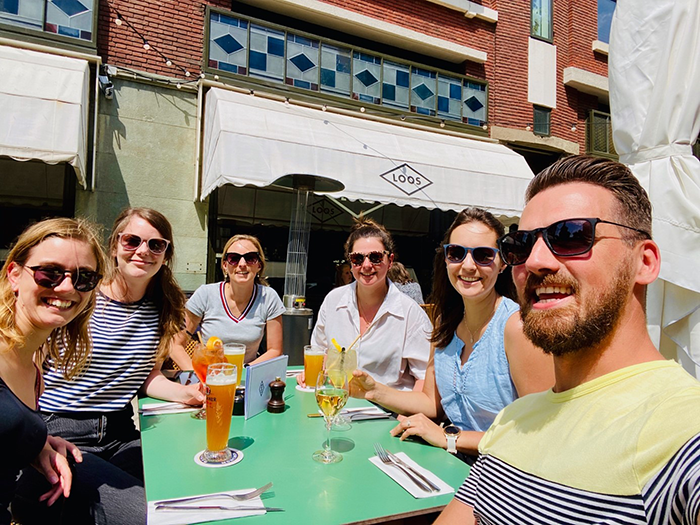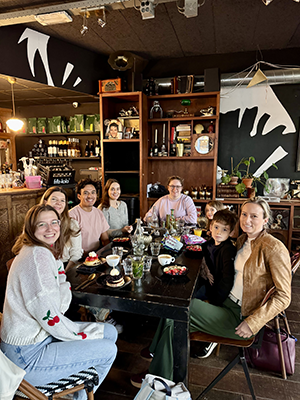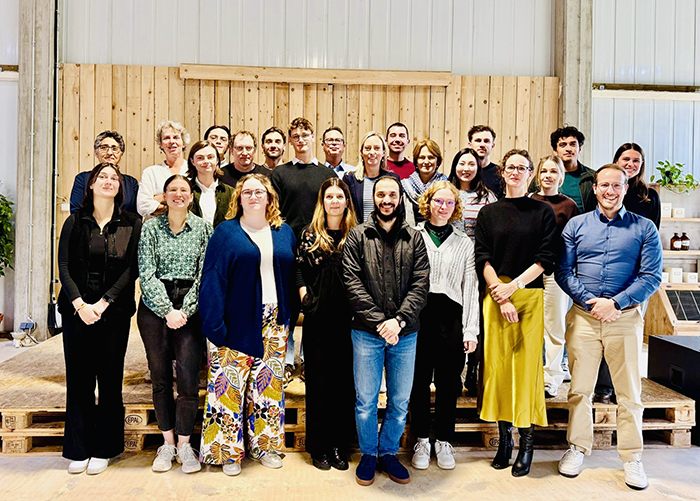About Rebekka K.M. Schneider, MD, PhD
Introduction
CELLULAR KEY DRIVERS OF BONE MARROW FIBROSIS
Primary myelofibrosis (PMF), an incurable blood cancer, is the prototypic example of the step-wise development of BM fibrosis. The specific mechanisms that cause BM fibrosis are not understood, in particular as the cells driving fibrosis have remained obscure. We demonstrated that Gli1+ cells are fibrosis-driving cells in BM fibrosis, that their frequency correlates with fibrosis severity in patients, and that their ablation ameliorates BM fibrosis. We further demonstrate that mesenchymal stromal progenitor cells are fibrosis-driving cells in mice and patients, that inflammation in the bone- marrow stroma precedes TGF-b signaling-driven fibrosis, and that the alarmin heterocomplex S100A8/S100A9 holds promise as MPN progression marker and therapeutic target Based on this work, we are preparing a clinical proof-of-concept trial translating our findings from pre-clinical models to improved treatments for patients.
In ongoing projects, we are diving deeper into mechanisms how fibrosis-driving cells are activated, how this is determined by the micro- and macro- bone marrow niche and on validating novel therapeutic targets and improved diagnostic markers.
Hematological Malignancies and Chronic Inflammatory Diseases
Chronic inflammatory diseases can have a significant effect on normal blood formation. A kidney-bone marrow cross-talk is indisputable as the kidneys filter the blood around 40x/day. However, this cross-talk is far less understood when the functions of either the bone marrow (e.g. through blood cancer) or the kidneys (e.g. chronic kidney disease; CKD) are impaired. In ongoing work, we focus on the vicious and mutual cross-talk between altered hematopoiesis and CKD.
BONE MARROW and KIDNEY IN A DISH
We have a long-standing interest in recapitulating organs in a dish using human cells or even patient-derived cells for pre-clinical testing. We have collaborations to apply different (smart) materials to provide specific structures for cells to grow, have patient-derived induced pluripotent stem cells (iPS cells) and generated organoids, in particular kidney organoids. We used these kidney organoids to identify the effect of SARS-COV2 on the kidney which correlated well with the situation in patients and helped to uncover a pro-fibrotic effect of SARS-Cov2 on organs.
Contact info:
r.k.schneider@erasmusmc.nl
Dept. of Developmental Biology
Erasmus MC
Education and career
Rebekka is a physician–scientist who is passionate about understanding how blood cancers develop and how the bone marrow environment shapes disease. She is a Principal Investigator at Erasmus MC in Rotterdam. With an M.D. from RWTH Aachen and a Ph.D. from Erasmus MC, she brings together clinical experience and scientific curiosity. Her postdoctoral work in Benjamin Ebert’s lab at Harvard Medical School strengthened her focus on disease-driven research and on finding new therapeutic opportunities for patients.
In her laboratory, Rebekka investigates why bone marrow becomes fibrotic in myeloproliferative neoplasms and how this process might be predicted, prevented, or reversed. Her team uncovered Gli1⁺ mesenchymal stromal cells as major drivers of fibrosis and showed that targeting Hedgehog signaling can restore healthy bone marrow function. They also study inflammatory signals—such as S100A8/S100A9 and CXCL4—that push the stem cell niche toward disease. The lab applies single cell multiome approaches with spatial resolution to identify the cellular and molecular drivers of disease. Their work that led to a Phase I/II HOVON trial (HOVON 172, NCT06605586) testing tasquinimod in patients with myelofibrosis.
Rebekka’s scientific contributions have been widely recognized: she is an ERC Starting Grant, ERC Consolidator Grant, and ERC Proof-of-Concept recipient, a Vidi laureate, and an Oncode Investigator. In 2023, she co-founded Sequantrix GmbH, a company developing innovative anti-fibrotic therapies.
Alongside her research, Rebekka is deeply committed to teaching and mentoring, especially at the interface between medicine and science. She enjoys helping young clinicians and researchers grow, drawing on her medical background to connect fundamental discoveries with patient care.
Her mission is to turn mechanistic insight into meaningful therapies—and to inspire the next generation of physician-scientists to do the same.
Publications
Selected Publications
Full publication list here
- Gleitz HFE, Fuchs SNR, Snoeren IAM, Boys C, Nagai J, Tejeda-Mora H, Klöker V, Pritchard JE, Bakker IJ, Gargallo Garasa M, Bindels E, Saez-Rodriguez J, Vogl T, Kramann R, Dugourd A, Costa IG, Schneider RK. Inhibiting the alarmin-driven hematopoiesis-stromal cell crosstalk in primary myelofibrosis ameliorates bone marrow fibrosis. Hemasphere. 2025 Aug 14;9(8):e70179. doi: 10.1002/hem3.70179.
- Sivaraj KK, … Schneider RK*, Adams RH*. Endothelial LATS2 is a suppressor of bone marrow fibrosis. Nature Cardiovascular Research 2024;3(8):951-969. doi: 10.1038/s44161-024-00508-x. *equal contribution
- Fuchs SNR, Stalmann USA, Snoeren IAM, Bindels E, Schmitz S, Banjanin B, Hoogenboezem RM, van Herk S, Saad M, Walter W, Haferlach T, Seillier L, Saez-Rodriguez J, Dugourd AJF, Lehmann KV, Ben-Neriah Y, Gleitz HFE, Schneider RK. Collaborative effect of Csnk1a1 haploinsufficiency and mutant p53 in Myc induction can promote leukemic transformation. Blood Advances. 2024 Feb 13;8(3):766-779. doi: 10.1182/bloodadvances.2022008926.PMID: 38147624
- Jansen J, Reimer KC, Nagai JS, Varghese FS, Overheul GJ, de Beer M, Roverts R, Daviran D, Fermin LAS, … Costa IG*, Schneider RK*, Smeets B*, Kramann R*. SARS-CoV-2 infects kidney cells and causes kidney fibrosis. Cell Stem Cell 2022; 29(2): 217-231. doi: 10.1016/j.stem.2021.12.010. *equal contribution.
- Leimkühler NB, Gleitz HFE, Ronghui L, Snoeren IAM, Fuchs SNR, Nagai JS, Banjanin B, Lam KH, Vogl T, Kuppe C, Stalmann USA, Büsche G, Kreipe H, Gütgemann I, Krebs P, Banz Y, Boor P, Tai EW, Brümmendorf TH, Koschmieder S, Crysandt M, Bindels E, Kramann R, Costa IG, Schneider RK. Heterogeneous bone marrow stromal progenitors drive myelofibrosis via a druggable alarmin axis. Cell Stem Cell 2021; 28(4): 637-652.e8. doi: 10.1016/j.stem.2020.11.004.
- Pritchard JE, …. Kramann R, Schneider RK. Non-canonical Hedgehog signaling mediates profibrotic hematopoiesis-stroma crosstalk in myeloproliferative neoplasms. Cell Reports. 2024 Jan 23;43(1):113608. doi: 10.1016/j.celrep.2023.113608.
- Stalmann USA, … Schneider RK. Genetic barcoding systematically compares genes in del(5q) MDS and reveals a central role for CSNK1A1 in clonal expansion. Blood Adv 2022; 6(6): 1780-1796. doi: 10.1182/bloodadvances.2021006061. Q
- Gleitz HFE, Snoeren IAM, Fuchs SNR, Leimkühler NB, Schneider RK. Isolation of human bone marrow stromal cells from bone marrow biopsies for single-cell RNA sequencing. STAR Protoc. 2021 May 12;2(2):100538. doi: 10.1016/j.xpro.2021.100538.
- Gleitz HFE, Dugourd AJF, Leimkühler NB, Snoeren IAM, Fuchs SNR, Menzel S, Ziegler S, Kröger N, Triviai I, Büsche G, Kreipe H, Banjanin B, Pritchard JE, Hoogenboezem R, Bindels EM, Schumacher N, Rose-John S, Elf S, Saez-Rodriguez J, Kramann R, Schneider RK. Increased CXCL4 expression in hematopoietic cells links inflammation and progression of bone marrow fibrosis in MPN. Blood 2020; 136(18): 2051-2064. doi: 10.1182/blood.2019004095.
- Schneider RK, … Kramann R. Gli1+ mesenchymal stromal cells are a key driver of bone marrow fibrosis and an important cellular therapeutic target. Cell Stem Cell 2018; 23(2): 308-309. doi: 10.1016/j.stem.2018.07.006.
- Schneider RK, … Ebert BL. Rps14 haploinsufficiency causes a block in erythroid differentiation mediated by S100A8/S100A9. Nat Med 2016; 22(3): 288-297. doi: 10.1038/nm.4047.
- Schneider RK, … Ebert BL. Role of casein kinase 1A1 in the biology and targeted therapy of del(5q) MDS. Cancer Cell. 2014; 26(4): 509-520. doi: 10.1016/j.ccr.2014.08.001.
- Kuppe C, …. Schneider RK, Saez-Rodriguez J, Henderson NC, Kramann R. Decoding myofibroblast origins in human kidney fibrosis. Nature 2021; 589(7841): 281-286. doi: 10.1038/s41586-020-2941-1. Q
- Ribezzo F*, Snoeren IAM*, ….Schneider RK. Rps14, Csnk1a1 and miRNA145/miRNA146a deficiency cooperate in the clinical phenotype and activation of the innate immune system in the 5q- syndrome. Leukemia 2019; 33(7): 1759-1772. doi: 10.1038/s41375-018-0350-3. *equal contribution. Q
- Schneider RK, …..Ebert BL. Role of casein kinase 1A1 in the biology and targeted therapy of del(5q) MDS. Cancer Cell. 2014; 26(4): 509-520. doi: 10.1016/j.ccr.2014.08.001. Q
- Leisten I, …. Schneider RK. 3D co-culture of hematopoietic stem and progenitor cells and mesenchymal stem cells in collagen scaffolds as a model of the hematopoietic niche. Biomaterials. 2012 Feb;33(6):1736-47.
Lab members
The Schneider Lab collaborates closely with the Gleitz Lab to advance research aimed at improving clinical outcomes for patients with myeloid malignancies. Several team members hold dual appointments, strengthening our joint scientific efforts.
Stijn Fuchs, BSc
Gerjanne Vroeg in de wei, BSc
Jessica Pritchard, MSc
Héctor Tejeda Mora, PhD



